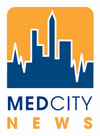
Dr. Carl Elliott takes a dim view of the influence medical device and pharmaceutical makers exert over the medical profession.
Elliott, a professor of bioethics and pediatrics at the University of Minnesota, doesn’t pull any punches in his latest book, “White Coat, Black Hat: Adventures on the Dark Side of Medicine.” Its descriptions of unscrupulous sales reps, ghost-written medical journal articles, compromised clinical trials — not to mention drug companies hiring poor people to serve as professional guinea pigs in drug trials, only to see their test subjects quit because of unpleasant side effects — paint a damning portrait of the two industries.
“Well, the book is not particularly kind to the drug and device industry, which seems to be your main readership,” Elliott wrote in an email to MedCity news.
“Carl Elliott’s excellent account of the interaction between the pharmaceutical industry and physicians over the last several decades paints a troubling picture,” according to the Boston Globe. “The book is a cross between investigative journalism and a reflection on how greed and a lack of concern for the health and well-being of the public have undermined the scientific foundation of medicine to the point where a severe crisis of confidence has emerged.”
Elliott kindly answered questions from MedCity News via e-mail:
MedCity News: Your book mostly focuses on the pharmaceutical industry, especially on its relationships with doctors. What’s your take on the relationship between device makers and physicians? Do Medtronic Inc.’s (NYSE:MDT) consulting payments to doctors constitute a conflict of interest?
Dr. Carl Elliott: Well, you could call it a conflict of interest, but I prefer the term “corruption.” Corruption suggests a destruction of trust, which is what has happened to medicine. How can you trust your doctor to make unbiased decisions if he’s getting huge consulting fees from a business with a clear financial interest in influencing his judgment? A lot of doctors used to fool themselves into thinking the money didn’t affect them, but by this point there is a huge body of empirical literature on the topic. To deny that you are influenced by the money takes a kind of studied ignorance.
MedCity News: The book talks about professional guinea pigs, people who volunteer for Phase I clinical trials. What kind of people do this? How greedy or desperate must you be to let companies test experimental drugs on you?
CE: It’s mostly desperation. You don’t see rich people taking untested drugs for money. You find unemployed people, contract workers, students, recent immigrants, ex-cons, homeless people — basically, anyone who needs money and has the time to check into a testing site for an extended period. There was a notorious case in the 90s where Eli Lilly was actually recruiting homeless alcoholics from a local shelter. In fact, until 2005, the largest testing site in North America was run out of dilapidated motel in Miami, where investigators were paying undocumented immigrants to sign up for Phase 1 trials. The testing site was eventually demolished for fire and safety violations, but the company running it simply changed its name from SFBC to PharmaNet and moved its headquarters to New Jersey. It is still in business.
MedCity News: Some people say Big Pharma’s business model is broken. Regardless of unethical or even illegal tactics, can pharmaceutical companies still make the big bucks today?
CE: Beats me.
MedCity News: Pharma and medical device companies complain the Food & Drug Administration is stifling innovation with stricter rules for approval. Has the pendulum swung too far? Or is this renewed focus on safety long overdue?
CE: Long overdue. I can’t remember a time when pharma and device companies didn’t complain about the FDA.
MedCity News: Dr. Jonas Salk invented the polio vaccine and then gave it away. Will we ever see another Jonas Salk in our lifetime?
CE: It seems unlikely, doesn’t it? Yet giving away an idea for free does sometimes happen in other spheres, such as information technology and computers. I’d like to think there are still some Jonas Salks out there. We’ve just created a system in which being Jonas Salk is a lot harder than it used to be.
MedCity News: Your bio says The Atlantic Monthly and The New Yorker pay you a lot to write articles. How can I get in on this action?
My bio? You must have been talking to my disgruntled brother. Maybe he can put you in touch with an editor.

